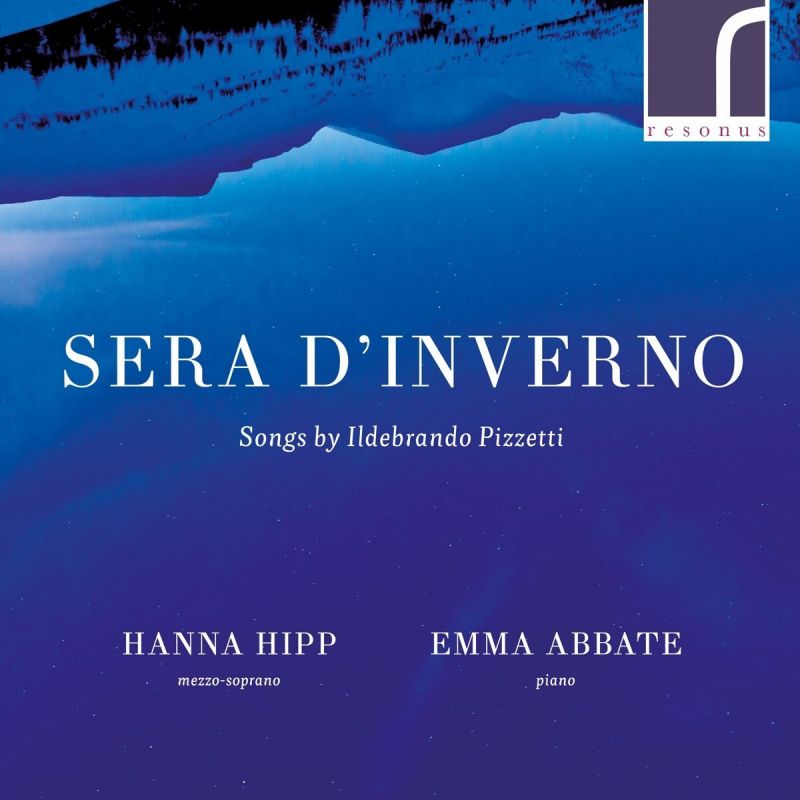Sera D'Inverno: Songs by Ildebrando Pizzetti
View record and artist detailsRecord and Artist Details
Composer or Director: Ildebrando Pizzetti
Genre:
Vocal
Label: Resonus Classics
Magazine Review Date: 05/2018
Media Format: CD or Download
Media Runtime: 55
Mastering:
DDD
Catalogue Number: RES10209

Tracks:
| Composition | Artist Credit |
|---|---|
| Sera d'inverno |
Ildebrando Pizzetti, Composer
Emma Abbate, Piano Hanna Hipp, Mezzo soprano Ildebrando Pizzetti, Composer |
| L'annuncio |
Ildebrando Pizzetti, Composer
Emma Abbate, Piano Hanna Hipp, Mezzo soprano Ildebrando Pizzetti, Composer |
| 5 Liriche |
Ildebrando Pizzetti, Composer
Emma Abbate, Piano Hanna Hipp, Mezzo soprano Ildebrando Pizzetti, Composer |
| Épitaphe |
Ildebrando Pizzetti, Composer
Emma Abbate, Piano Hanna Hipp, Mezzo soprano Ildebrando Pizzetti, Composer |
| Antifona amatoria si Basiliola |
Ildebrando Pizzetti, Composer
Emma Abbate, Piano Hanna Hipp, Mezzo soprano Ildebrando Pizzetti, Composer |
| E il mio dolore io canto |
Ildebrando Pizzetti, Composer
Emma Abbate, Piano Hanna Hipp, Mezzo soprano Ildebrando Pizzetti, Composer |
| Tre Liriche, Movement: Incontro di Marzo |
Ildebrando Pizzetti, Composer
Emma Abbate, Piano Hanna Hipp, Mezzo soprano Ildebrando Pizzetti, Composer |
| (2) Canti d'Amore |
Ildebrando Pizzetti, Composer
Emma Abbate, Piano Hanna Hipp, Mezzo soprano Ildebrando Pizzetti, Composer |
| Tre Liriche, Movement: Scuote amore il mio cuore |
Ildebrando Pizzetti, Composer
Emma Abbate, Piano Hanna Hipp, Mezzo soprano Ildebrando Pizzetti, Composer |
| Tre Canti Greci |
Ildebrando Pizzetti, Composer
Emma Abbate, Piano Hanna Hipp, Mezzo soprano Ildebrando Pizzetti, Composer |
Author: Tim Ashley
Abbate and mezzo Hanna Hipp give us 17 of his 31 liriche (he used the term as the Italian equivalent of Lieder or mélodies), composed between 1903 and 1956. Anyone acquainted with Pizzetti’s best-known work, the 1958 opera Assasinio nella cattedrale, will find themselves in familiar territory with regard to his rather lofty textual approach. He was finicky as to what he set, preferring poets he considered major writers, whether ancient or modern, though it is hard, on occasion, to share his enthusiasm for some of his contemporaries. Debussy’s influence is apparent in his fondness for melodic lines derived from speech patterns, rising and falling syllabically as time signatures shift continuously, a compositional method heard most strikingly in ‘I pastori’ from the Cinque Liriche of 1916. Like many of his generation, however, he was drawn to early music: both plainchant and Monteverdian ariosi lurk behind the beautiful Due Canti d’amore and the ‘Antifona amatoria di Basiliola’, an excerpt from his incidental music for Gabriele D’Annunzio’s 1908 play La nave.
Many of the songs are notably bleak or stark in mood: Hipp and Abbate deliver them with considerable intensity. Hipp’s gleaming sound and declamatory fire impress in the anguished ‘La madre al figlio lontano’ from the Cinque Liriche, in which a mother waits in vain for her absent son’s return. One admires her lyrical restraint in the sexually ambiguous ‘Paseggiata’, which closes the same set, and the suggestive, but sparing way she uses her chest register in ‘Scuote amore il mio cuore’, a turbulent yet ravishing setting of Sappho. Abbate, meanwhile, breathes life into piano-writing that is frequently sparse but in which every shift of rhythm or colour speaks volumes. The accompanying booklet prints texts and translations consecutively rather than side by side, which can be annoying. The main article, meanwhile, is excerpted, not always ideally, from A Singer’s Guide to the Songs of Ildebrando Pizzetti, a doctoral thesis by Mark Whatley, associate professor at Belmont University in Nashville, Tennessee. You can however, download the full thesis as a PDF: it’s well worth reading it before you listen.
Discover the world's largest classical music catalogue with Presto Music.

Gramophone Digital Club
- Digital Edition
- Digital Archive
- Reviews Database
- Full website access
From £8.75 / month
Subscribe
Gramophone Full Club
- Print Edition
- Digital Edition
- Digital Archive
- Reviews Database
- Full website access
From £11.00 / month
Subscribe
If you are a library, university or other organisation that would be interested in an institutional subscription to Gramophone please click here for further information.




